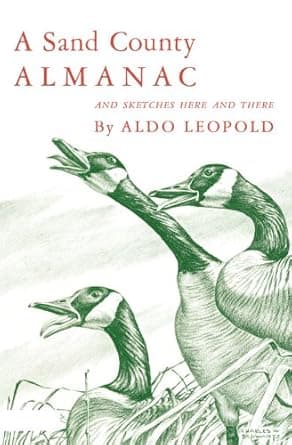
Book Stats
367
Upvotes
45
Downvotes
+322
Net Score
A Sand County Almanac
by Aldo Leopold
Description
Leopold's influential collection of essays on wilderness, wildlife, and land ethics, establishing foundational principles for the environmental movement.
Aldo Leopold's collection of essays combines careful natural observation with philosophical reflection on humanity's relationship to the land. Written during weekends at his family's Wisconsin farm, these pieces reveal a conservationist's evolving understanding of ecological relationships and environmental ethics.
The book's structure follows the calendar year, with each month's essays capturing the seasonal rhythms of the natural world. Leopold's descriptions of wildlife behavior, plant growth, and ecological relationships demonstrate both scientific knowledge and poetic sensibility.
Leopold's famous "Land Ethic" essay articulates a revolutionary approach to environmental responsibility. His assertion that "a thing is right when it tends to preserve the integrity, stability, and beauty of the biotic community" challenged anthropocentric views of nature that see land only as a resource for human use.
The book's treatment of predators reveals Leopold's changing understanding of ecological relationships. His account of killing a wolf and watching "the fierce green fire" die in its eyes shows how direct experience can transform abstract knowledge into emotional understanding.
Leopold's discussion of wilderness and recreation anticipates many contemporary debates about land use and conservation. His vision of wilderness as essential for human spiritual development, combined with practical arguments about biodiversity and ecosystem services, provides a multifaceted case for preservation.
The essays' blend of scientific observation and literary expression established a model for nature writing that influences environmental authors today. Leopold demonstrates that effective conservation requires both scientific understanding and emotional connection to the natural world.
A Sand County Almanac has inspired generations of conservationists and continues to provide philosophical grounding for environmental activism. Leopold's insights about ecological relationships and environmental ethics remain relevant as society grapples with climate change, biodiversity loss, and sustainable development.